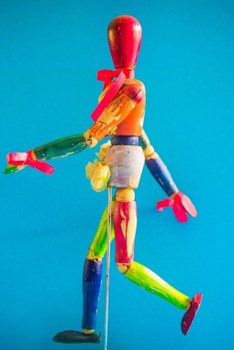The MAIA project, funded by the European Union, aims to develop an artificial intelligence system to promote the autonomy of people with mobility difficulties. Patients need reliable, multifunctional, adaptive and interactive, i.e. intelligent, aids. MAIA proposes to develop a human-centred artificial intelligence that allows controlling prosthetic and assistive devices, capturing the intentions to perform an action through the implantation of a brain sensor in the patient. MAIA's technology will be interactive, encouraging the comparison between the decisions of the technological system and the will of the user, based on the model of the brain-machine interface in which neural signals coming mainly from the motor cortices are used. Furthermore, the patient will have complete control over MAIA, activating and deactivating it according to their needs. MAIA can be compared to an autopilot system: the pilot of the aircraft can delegate complete control of flight operations to the autopilot or, under specific conditions or needs, deactivate it partially or entirely, regaining complete control of the aircraft.

The development of MAIA follows the user-centre design model, which is a scientific process of technological development that positions the end-user (the person with motor disabilities and their caregivers) at the centre of the design. Your involvement is essential because it introduces insights, realistic problems, and real-life experiences into the discussion, which increase the acceptability and compliance of the product once considered and resolved.
In the design of MAIA, it is therefore essential to know the opinions, needs and requirements of people with motor disabilities and their caregivers.
If you are a person with an acquired motor disability (or a caregiver), aged between 18 and 80, and you are interested in participating and receiving more details, you can contact us at the following email: psi.maia@unibo.it

According to the World Report on Disability of the World Health Organization (2011), the worldwide prevalence of disability is around 20%, that is, one person in five individuals is affected by some disability. In industrialized societies, the most frequent causes of severe motor disability with loss of personal autonomy are represented by acquired brain injuries (from vascular or traumatic causes) and spinal cord damage (from both traumatic and non-traumatic causes). In particular, around 15 million people worldwide are affected by strokes each year and almost 33% of them have a permanent disability. Similarly, an estimated 27.8 million new traumatic brain injuries and around 900,000 new spinal injuries occur worldwide each year.
As for Italy, the 2019 ISTAT Report estimates that 7.2% of the Italian population over 15 years have severe motor limitations, strongly compromising people's autonomy and active participation in social life.
Despite the alarming data on disability in the population and the progress of knowledge on neurogenesis and neuronal plasticity, technological solutions are not expected in the short term that will promote a complete recovery based on the regeneration of damaged nerve tissues. Therefore, once the rehabilitation interventions are finished, it is likely that a condition of severe disability will remain such due to the lack of adequate response technologies.